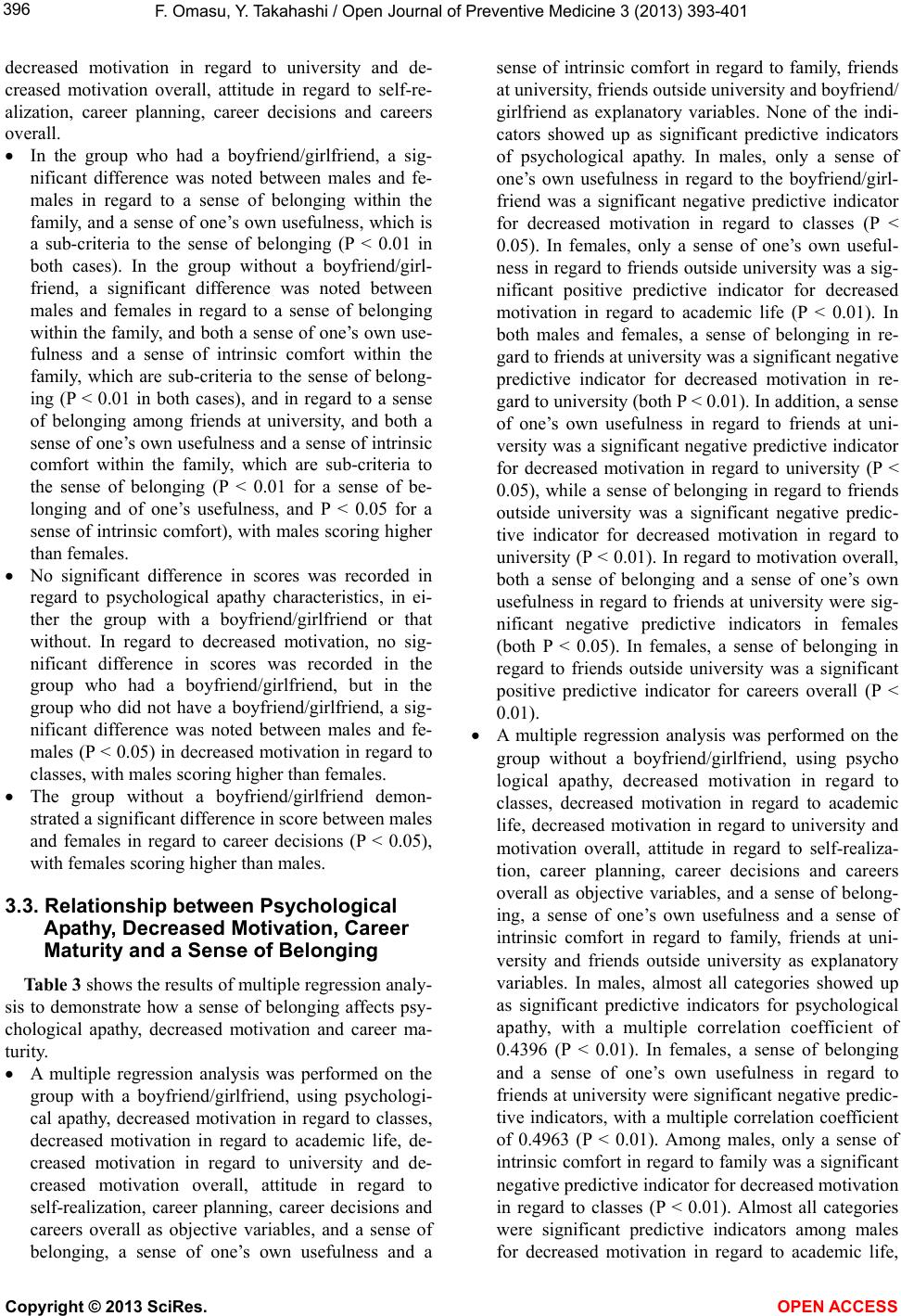
F. Omasu, Y. Takahashi / Open Journal of Preventive Medicine 3 (201 3) 393-401
396
decreased motivation in regard to university and de-
creased motivation overall, attitude in regard to self-re-
alization, career planning, career decisions and careers
overall.
In the group who had a boyfriend/girlfriend, a sig-
nificant difference was noted between males and fe-
males in regard to a sense of belonging within the
family, and a sense of one’s own usefulness, which is
a sub-criteria to the sense of belonging (P < 0.01 in
both cases). In the group without a boyfriend/girl-
friend, a significant difference was noted between
males and females in regard to a sense of belonging
within the family, and both a sense of one’s own use-
fulness and a sense of intrinsic comfort within the
family, which are sub-criteria to the sense of belong-
ing (P < 0.01 in both cases), and in regard to a sense
of belonging among friends at university, and both a
sense of one’s own usefulness and a sense of intrinsic
comfort within the family, which are sub-criteria to
the sense of belonging (P < 0.01 for a sense of be-
longing and of one’s usefulness, and P < 0.05 for a
sense of intrinsic comfort), with males scoring higher
than females.
No significant difference in scores was recorded in
regard to psychological apathy characteristics, in ei-
ther the group with a boyfriend/girlfriend or that
without. In regard to decreased motivation, no sig-
nificant difference in scores was recorded in the
group who had a boyfriend/girlfriend, but in the
group who did not have a boyfriend/girlfriend, a sig-
nificant difference was noted between males and fe-
males (P < 0.05) in decreased motivation in regard to
classes, with males scoring higher than females.
The group without a boyfriend/girlfriend demon-
strated a significant difference in score between males
and females in regard to career decisions (P < 0.05),
with females scoring higher than males.
3.3. Relationship between Psychological
Apathy, Decreased Motivation, Career
Maturity and a Sense of Belonging
Table 3 shows the results of multiple regression analy-
sis to demonstrate how a sense of belonging affects psy-
chological apathy, decreased motivation and career ma-
turity.
A multiple regression analysis was performed on the
group with a boyfriend/girlfriend, using psychologi-
cal apathy, decreased motivation in regard to classes,
decreased motivation in regard to academic life, de-
creased motivation in regard to university and de-
creased motivation overall, attitude in regard to
self-realization, career planning, career decisions and
careers overall as objective variables, and a sense of
belonging, a sense of one’s own usefulness and a
sense of intrinsic comfort in regard to family, friends
at university, friends outside university and boyfriend/
girlfriend as explanatory variables. None of the indi-
cators showed up as significant predictive indicators
of psychological apathy. In males, only a sense of
one’s own usefulness in regard to the boyfriend/girl-
friend was a significant negative predictive indicator
for decreased motivation in regard to classes (P <
0.05). In females, only a sense of one’s own useful-
ness in regard to friends outside university was a sig-
nificant positive predictive indicator for decreased
motivation in regard to academic life (P < 0.01). In
both males and females, a sense of belonging in re-
gard to friends at university was a significant negative
predictive indicator for decreased motivation in re-
gard to university (both P < 0.01). In addition, a sense
of one’s own usefulness in regard to friends at uni-
versity was a significant negative predictive indicator
for decreased motivation in regard to university (P <
0.05), while a sense of belonging in regard to friends
outside university was a significant negative predic-
tive indicator for decreased motivation in regard to
university (P < 0.01). In regard to motivation overall,
both a sense of belonging and a sense of one’s own
usefulness in regard to friends at university were sig-
nificant negative predictive indicators in females
(both P < 0.05). In females, a sense of belonging in
regard to friends outside university was a significant
positive predictive indicator for careers overall (P <
0.01).
A multiple regression analysis was performed on the
group without a boyfriend/girlfriend, using psycho
logical apathy, decreased motivation in regard to
classes, decreased motivation in regard to academic
life, decreased motivation in regard to university and
motivation overall, attitude in regard to self-realiza-
tion, career planning, career decisions and careers
overall as objective variables, and a sense of belong-
ing, a sense of one’s own usefulness and a sense of
intrinsic comfort in regard to family, friends at uni-
versity and friends outside university as explanatory
variables. In males, almost all categories showed up
as significant predictive indicators for psychological
apathy, with a multiple correlation coefficient of
0.4396 (P < 0.01). In females, a sense of belonging
and a sense of one’s own usefulness in regard to
friends at university were significant negative predic-
tive indicators, with a multiple correlation coefficient
of 0.4963 (P < 0.01). Among males, only a sense of
intrinsic comfort in regard to family was a significant
negative predictive indicator for decreased motivation
in regard to classes (P < 0.01). Almost all categories
were significant predictive indicators among males
for decreased motivation in regard to academic life,
Copyright © 2013 SciRes. OPEN A CCESS